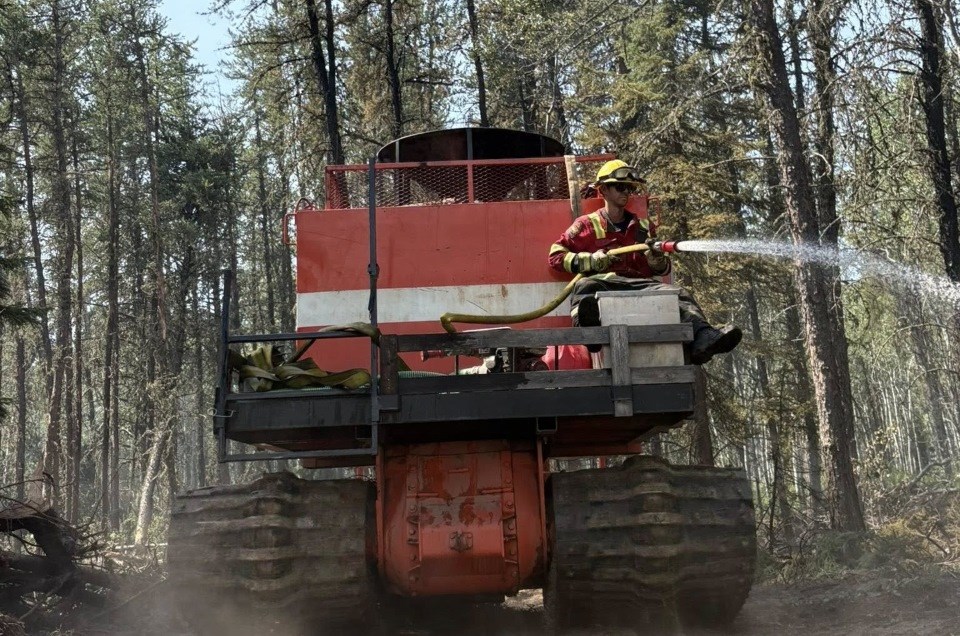ESTEVAN — Members of the Estevan Fire Rescue Service (EFRS) continue to do what they can to combat wildfires in northern Saskatchewan.
A total of 10 members of the department have been in the northern community of Patuanak on a rotating basis since the EFRS started sending members up north July 14. Two of them, Deputy Fire Chief Kyle Luc and Firefighter Nolan LaCoste, were part of a contingent that returned home Aug. 2. Luc had been up north for six days, while LaCoste had an 18-day stint.
Luc said it's a different experience when combating forest fires versus grass fires.
"Things are obviously done a little bit different when you're dealing with various fire departments, helicopters, lots of large equipment, to fight the fires versus what we do here," Luc said.
LaCoste, who has been a member of the EFRS for just over 14 years, said he believes this is the first deployment of this type ever for the EFRS, so the local contingent had no idea what to expect or what their expectations should be.
"It was an amazing experience, working and interacting with the different departments or the people from Patuanak, it just really met or exceeded what I had expected, so I'm super happy I was able to go up there for as long as I did," said LaCoste.
LaCoste said he initially planned to be up north for 12 days as part of the initial crew, but the opportunity came up to stay for six more days, and he jumped at the chance.
"I was able to stay extra, so I thought I might as well stay and see what it would bring," said LaCoste.
Four kilometres of hose to fight fires
Each day their duties changed based on the incident action plan that was in place.
"There were days where we were patrolling in the community if they thought the fire could make a run, and … one day we rolled four kilometres of hose because of the threat of fire coming to burn it all up. There were days we were out there on nozzles, putting out hot spots, putting flames out," said Luc.
The first 12 days LaCoste spent in the Patuanak area were largely dedicated to patrolling, because at that point, the fire was a distance away. But one day of strong winds could change the situation.
"We helped set up a sprinkler system one day in the area that we were patrolling," said LaCoste. "A company out of B.C. was in charge of setting up sprinklers. So, we helped them as needed."
In the last six days, they had more active firefighting, including the long day of rolling hose.
They wanted to go
Luc said when the EFRS was asked to send members up north, it was "something different". The local members were able to work with different departments, network with people and see how other services operate to protect Saskatchewan residents.
"It's truly an amazing experience once you get up there and see the magnitude of these fires," said Luc. "We sit here in Estevan and see the smoke come through, but you don't really see anything until you're actually up there in the thick of it all."
LaCoste said it was a chance to have a new experience, something they wouldn't ever see around here, while doing some "tangible" good for others.
"They appreciated us being up there and still are [appreciative]," said LaCoste.
Even though he's a deputy chief in Estevan, Luc said his duties weren't any different than the other firefighters on the ground in Patuanak. On the fire line every day, everybody was on the same level, so they took turns with various tasks.
Luc also found it interesting to see what other departments have for personal protective equipment for wildland firefighting and more. Both were keen to interact with the other departments.
"Firefighters are very similar no matter where they are based. Everyone that we met there just wanted to get out and get the job done … and I felt like for the most part, we really clicked with the other departments, and we … meshed very well with the other guys that were there," said LaCoste.
EFRS able to meet local needs
The current crew from the EFRS said they would continue their deployment up north, Luc said. If the Saskatchewan Public Safety Agency wants the EFRS to keep sending assistance, and if the EFRS has adequate manpower, then Luc and LaCoste said they would be open to returning to Patuanak.
"The people of Patuanak or English River First Nation, they treated us phenomenally up there, and I would take the opportunity to go back if it came about," said Luc.
The EFRS tries to put the call out for people to go up north a couple of weeks in advance, Luc said, so they know how many members they will have remaining in Estevan. Luc said the EFRS has handled the situation well.
"Obviously the city of Estevan is first and foremost for us, so if we didn't have the resources, we would not be deploying people up north. We had 26 calls in July, and it was pretty status quo. Trucks rolled out the door every time there was a fire. We're pretty lucky that the group of people that we have here, everyone's dedicated so they know that if we have four guys out of town, everybody steps up and gets the job done."
Joining LaCoste for the first 12 days were Lt. Justin Herod, Firefighter Colby Wainman and Austin Dovell. Those three were replaced by Luc, Lt. Tyler Stead and Firefighter Nathan Rae. Wainman is back up north for additional service, and is joined by Firefighters Ben Brokenshire, Darson Gunnlaugson and John Wells.
SaskToday will continue to have coverage of the wildfires and the impact felt throughout the province.




